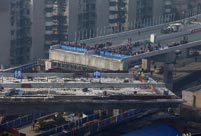 Int'l Snow Sculpture Art Expo in Harbin
Int'l Snow Sculpture Art Expo in Harbin Sichuan money wall for dividend payment
Sichuan money wall for dividend payment Li Na crashes Belinda Bencic in 2nd round at Australian Open
Li Na crashes Belinda Bencic in 2nd round at Australian Open
 Shocking moments when PLA's weapons open fire
Shocking moments when PLA's weapons open fire Famous Lanzhou beef noodles
Famous Lanzhou beef noodles Armed Police hold anti-terrorism drill in SE China's Xiamen
Armed Police hold anti-terrorism drill in SE China's Xiamen Harbin Int'l Ice and Snow Festival opens
Harbin Int'l Ice and Snow Festival opens 'Jin' named the word of the year by cross-strait netizens
'Jin' named the word of the year by cross-strait netizens Chinese scientific expedition goes to build new Antarctica station
Chinese scientific expedition goes to build new Antarctica station
Afghanistan: Reconstruction has many uncertainties
After more than a year of wrangling, the United States and Afghanistan recently reached an agreement on the final language of a bilateral security agreement.
However, Afghan President Hamid Karzai made a new request to postpone the signing of the agreement. The U.S. responded by threatening to withdraw its troops completely and cut off aid to Afghanistan unless Karzai signed the agreement as soon as possible.
On the one hand Karzai believes the U.S. will not abandon Afghanistan, in a bid to fight for more rights; on the other hand he needs to rid himself of his tainted reputation as a 'traitor'. The probability is that both sides will sign the agreement, but if the U.S. starts to implement full withdrawal from Afghanistan, there will be an intensification of unrest in the country.
The Afghan presidential election will be held on April 5 2014. In the current situation, whether the elections will be held on schedule, whether they will lead to unrest, and who will emerge victor, are all still open to question. The results of the election need to be recognized by the majority of the people, otherwise they will spark a further outbreak of civil unrest.
With the U.S. withdrawal, the Afghan national army and police will gradually assume independent responsibility for security; their capacity will be tested to the full.
The Afghan Taliban's strength has reduced greatly, it is less likely to stage a comeback, but its ability to derail the reconstruction of the country should not be underestimated. To seek greater political space after the US withdrawal, peace talks with moderate Taliban members are the most realistic choice - Taliban hardliners are inclined to bide their time until the "security vacuum" after the US withdrawal. It will be no easy matter to achieve lasting peace and stability in Afghanistan, since peace talks between Afghanistan government and Taliban have not even started.


 A 60-hour journey home
A 60-hour journey home Int'l Snow Sculpture Art Expo
Int'l Snow Sculpture Art Expo Highlights of China's air force
Highlights of China's air force Airline crew stage flashmob dance at Kunming airport
Airline crew stage flashmob dance at Kunming airport Top15 countries to retire to in 2014
Top15 countries to retire to in 2014 Hot supermodel's new photo album released
Hot supermodel's new photo album released Asia's heaviest box girder finishes 'rotation' in Wuhan
Asia's heaviest box girder finishes 'rotation' in Wuhan Completed facade of People's Daily new headquarters
Completed facade of People's Daily new headquarters Chinese-branded car passes North America standard safety test for the first time
Chinese-branded car passes North America standard safety test for the first time Li Na beats Bouchard to reach Australian final
Li Na beats Bouchard to reach Australian final  Explore the sources of PM 2.5
Explore the sources of PM 2.5 Highlights of Chinese airborne troops'exercises
Highlights of Chinese airborne troops'exercises  'Living in ice house' competition held in central China
'Living in ice house' competition held in central China  Chinese figure in Oscar nominations
Chinese figure in Oscar nominations  Top ten aerospace events in China 2013
Top ten aerospace events in China 2013Day|Week|Month